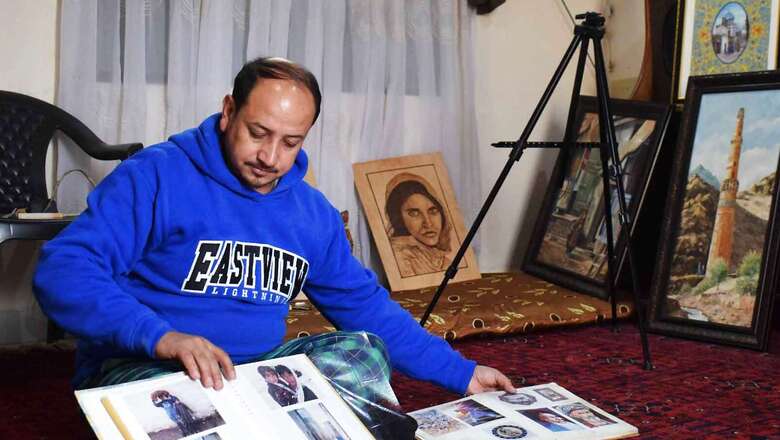
views
As the fighting continues in Afghanistan with Taliban on the offensive and Afghan government forces retreating from the territories, the wait for refugees living thousands of kilometres from their homeland have prolonged for many more years, or perhaps decades.
Living in Delhi’s Jangpura, Dawood Sharifi, a refugee who has been living in India for more than seven years says, “Though I may wish to return to my homeland, my children who were born in this country (India) won’t like to go back to Afghanistan. Everywhere in Afghanistan there is violence, war and torture. If you go there, you die.”
While Sharifi speaks in Delhi, tens of thousands of people have fled their homes in northern Afghanistan to escape battles that have overwhelmed their towns and villages as government forces fail to fend off rapidly advancing Taliban forces.
Sharifi, who also heads the Afghan refugees association in Delhi, says there are around 30,000 Afghan nationals seeking refuge in India. India is among few countries that host Afghan refugees, others being Iran and Pakistan among others. The four decades of war in Afghanistan as per UN High Commission for Refugees has rendered more than 2.6 million people as refugees, data from the United Nations High Commissioner for Refugees (UNHCR) says.
The actual number is feared to be much higher by many Non-Government Organisations- with Amnesty International terming the Afghan refugees as the largest protracted population in the world. Delhi has been home to Afghan refugees as early as two decades when people from the war-torn country started settling in Lajpat Nagar, Jangpura, Bhogal and Old Delhi area of the national capital.
Though many have fled Afghanistan for survival, there are others like Akbar Farhad who face the risk of violence in the hands of Taliban. Farhad has been a painter painting for the last three decades and was a popular artist in Afghanistan, but migrated in 2018.
“I can’t return to Afghanistan as Taliban consider painting as haram. They have ruled it un-islamic. I can’t return back to the country because my profession won’t be accepted there,” Farhad says.
Reports suggest that Taliban have been strictly enforcing a very orthodox culture based on Islamic practices where there are strict rules of purdah and strict cultural rules. The practices include banning any form of human art or portraits.
Farhad shows out the paintings he has carried back from his homeland. Among others, he has an oil painting of the famous Bamiyan Buddha sculpture and “The Afghan Girl” – the famous portrait of an Afghan refugee Sharbat Gula in Pakistan. Farhad’s paintings were widely revered back in his country. He shows a directory of Afghan artists compiled by UNESCO where he proudly locates his name among the list of artists.
Though India may be a safe haven from the fighting in Afghanistan, the nationals say that their status as refugees always stands out in their way.
“Initially we had issues getting the Aadhaar card, and our children won’t get admission in the local schools due to the documentation. We can’t even get sim cards easily,” Dawood Sharifi said.
UNHCR which provides assistance to refugees recognizes 8,275 refugees from Afghanistan in India in 2020. The recognition from UNHCR provides the refugees with access to education, rent and legal stay in the country giving the asylum.
However, not everybody gets recognition from the international aid agency. The remaining refugees who come under temporary visas have to return back or overstay illegally.
Covid-19 and the joblessness further intensified the problem. “My art classes shut down during the Coronavirus pandemic. I have very few students to teach. The living cost and house rent are very expensive and hard to bear,” Akbar Farhad says. Farhad has been receiving some orders for paintings and portraits through his smartphone and gives art classes to few students to make a living.
But there are others waiting to migrate from Afghanistan as Taliban takes control of key provincial capitals. “Two of my friends and relatives have submitted their passport for getting a visa. But even after twenty days they haven’t got any response. The foreign embassies are closing down. Only few embassies have been left in Kabul,” Dawood Sharifi said.
India last Tuesday evacuated its diplomats and personnel from its consulate in Mazar-e-Sharif- the largest city of north Afghanistan with the escalation of violence. It comes after Indian diplomats and staff left the Kandahar consulate last month.
With the fighting going on in Afghanistan for more than two decades now, the refugees await peace- the only condition for their return to the homeland. “If the Taliban comes there, I won’t go back even if I have to beg or live on the roads here,” Sharifi adds.
Read all the Latest News, Breaking News and Coronavirus News here.




















Comments
0 comment